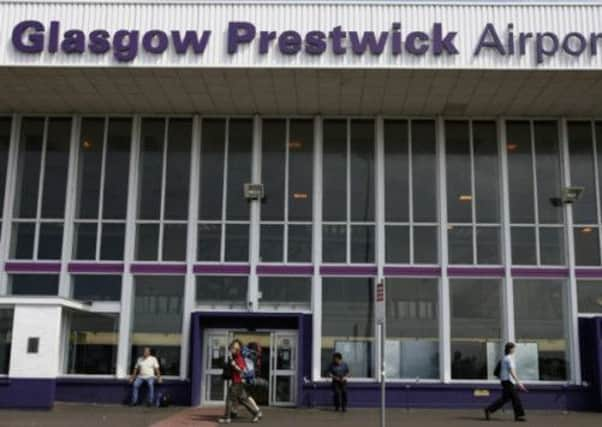Dani Garavelli: Wing and a prayer for Prestwick to soar again


In any case, having those huge mechanical birds criss-cross your own personal piece of sky was a source of wonder, not irritation.
So thrilling was it, we didn’t confine ourselves to plane-spotting from the garden. Many’s the fine (and more often rainy) day we walked over to the outside observation deck to get a closer look. Admittedly, there wasn’t much to do in Prestwick back then. Long gone were the days when the promenade boasted an open-air swimming pool heaving with day-trippers (although you could still ride on a donkey and have your photo taken with a dressed-up monkey). But sitting in the Scottish drizzle watching jets depart for the States at least offered the tantalising promise of a more exotic world on the other side of the Atlantic.
Advertisement
Hide AdAdvertisement
Hide AdThings got more exciting still when Concorde began to make appearances in the 1970s. Its pointed nose and sonic boom were impressive enough to make people stare long after its presence ceased to be unusual. And then, of course, there was the air show. Every two years, tens of thousands of people would gather to eat sandwiches and watch a display that always climaxed with the Red Arrows.
I might have been wee, but I was proud my town had an airport. Everyone was. I didn’t know it was supposed to be the only place in Britain Elvis had ever stepped foot, but I did know it had the longest runway in the country and that it was famous for being fog-free. That second fact was one I set particular store by, as if I were somehow responsible for the town’s coastal location and micro-climate.
Over the years, of course, Prestwick Airport declined. By the time I was in my mid-teens and we were heading off on package holidays, we were forced to fly from Glasgow. But after I moved away, and ever since, the sight of planes lined up behind the fence, close to the A79, has meant just one thing: I’m home again.
You’ll gather, then, that I’m slightly biased when it comes to the SNP’s decision to nationalise it. I can see that from an objective perspective it could seem incredibly rash. Passenger numbers have dropped to just over a million from their peak of 2.4 million in 2007 and the airport is losing about £7m a year. Ryanair is its only carrier and, although it still operates 27 routes, it no longer flies to London.
On the other hand, the airport is crucial to the Ayrshire economy, which has already been battered by a succession of factory closures, and has an incredible history, as the inaugural World Festival of Flight held in the town last month demonstrated: surely it’s right for the government to do everything it can to save it.
Prestwick Airport does have things going for it. It still has the longest runway in Scotland, which, as festival organiser, journalist and SNP politician George Kerevan has pointed out, makes it an ideal site for a trans-Atlantic freight hub and a maintenance base for giant airliners like the Airbus A380 that Glasgow cannot accommodate; it is the only airport in Scotland to have its own railway station; and its mild climate means it’s still the place planes land when severe weather renders other airports unusable. Anyone who has travelled to Paris via Beauvais Airport knows its distance from the city is not in itself an obstacle to its success.
It is true it has found it difficult to attract other airlines (Polish company Wizz Air switched to Glasgow this year) but the most fleeting glimpse of the terminal frontage is enough to see it is in need of investment. Stripping it of its dreadful “Pure Dead Brilliant” slogan, revamping its interior and renaming it Robert Burns Airport could make it a much more attractive proposition.
Passenger numbers have decreased at airports across Europe since the economic crisis began in 2008, but as the economy bounces back and greener air travel is pioneered, they are forecast to rise again. Add to this the very real possibility that control over air passenger duty (the tax blamed for Ryanair’s decision to axe its Prestwick to London flights) might be devolved, and is there any real reason it couldn’t eventually flourish? It’s worth remembering that just six years ago, it was handling enough passengers to keep it afloat without posing any threat to Glasgow.
Advertisement
Hide AdAdvertisement
Hide AdPerhaps this view is over-optimistic, but while I was researching this piece I came across a newspaper cutting from 1983, in which Prestwick was branded a lost cause by the chairman of British Midland Airways. At the time, it was handling just 250,000 passengers a year and making a loss of £3.4m. Yet, as South Ayrshire councillor Ann Galbraith points out in her book The Dream That Wouldn’t Die: The 50-Year Fight For Prestwick Airport, its purchase by Canadian entrepreneur Matthew Hudson and the growth of the no-frills market were to prove its salvation. Down, but not necessarily out, Prestwick has come back from the brink before; let’s hope that, with the right strategy, it can again be restored to its former glory. «
Twitter: @DaniGaravelli1